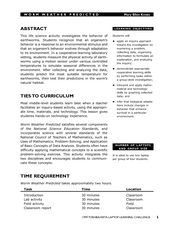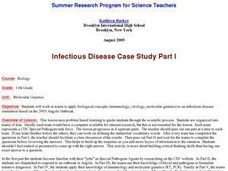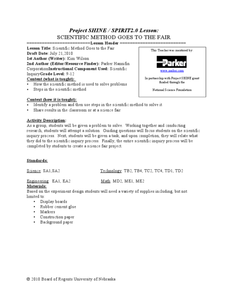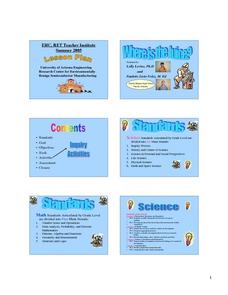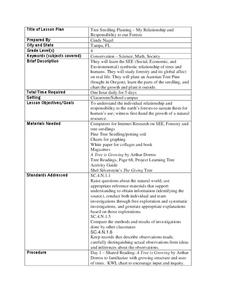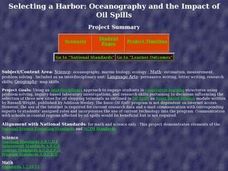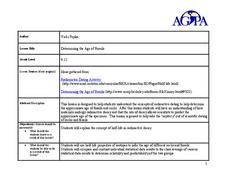Curated OER
Pre History through Modern Day Timeline
Students explore the historical sequence of cultures throughout history. They demonstrate the ability to organize events in chronological order and demonstrate how time is measured and annotated.
Curated OER
Presidential Trading Cards
Learners research the Internet to collect data about the US Presidents. They use the data that they collect along with available technology to produce trading cards and brochures using keyboarding skills, text boxes, acquiring photos,...
Alabama Learning Exchange
Light, Dry and Nutritious - A Look at Dehydrated Food
Fifth graders study dehydration and dehydration of foods. They measure the amount of water lost from fruits as they are dehydrated. They use desktop publishing software to design an advertisement for dehydrated fruit after researching...
Curated OER
Polymers and Products from Petroleum
Over four sessions, learners survey the production and use of polymers and petroleum products. First, they participate in a kinesthetic activity to demonstrate how polymers act, and review a list of common products made from polymers....
Mascil Project
Parachute Food Drop
Drop a perfect project into your lesson plans. Groups use different building materials to create models of parachutes for food drops. After testing out their prototypes, they make improvements to their designs.
National Science Teachers Association
Hop into Action
Young scientists find out what makes amphibians such unique and interesting animals in this simple life science activity. After looking at pictures and discussing the characteristics of amphibians, learners complete a series of three...
Nazareth College
Create Your Own Tornado
Third graders identify key concepts and definitions about tornados. They work in small groups of three to four to create mini-tornados. After reading Tornado Alert as a class, 3rd graders discuss tornados and fill out a KWL chart.
Curated OER
Worm Weather Predicted
Students examine worm habitats. In this animal habitats lesson, students participate in a lab activity that requires them to explore the adaptations that earthworms make to their environment.
Curated OER
Infectious Disease Case Study Part I
Eleventh graders work together to complete a simulation on infectious diseases. They determine which concepts affect a disease more. They complete discussion questions as well.
Curated OER
An Encyclo-ME-dia for Every Child
Students create a digital scrapbook that shows information-text and pictures that are specific to each child. They make charts and graphs. They use digital cameras, scanners, software, to write captions, stories, poems, letters, and...
Curated OER
Ramps 2: Ramp Builder
Students plan, build, and test a ramp that allows objects to roll far. After each group has tested out their ramps, allow them to test their design against the record previously established by the prototype ramp.
Curated OER
MAISA and the REMC Association of Michigan
Students complete online research to study geography's impact on weather. In this geography and weather lesson, students research weather in their city for ten days using an online website. Students bookmark the site, enter data into a...
Curated OER
Plant Diversity and Distribution
Learners construct a defined plot on school grounds and observed patterns in plant life. They count trees, shrubs, cacti and record on a data sheet. They compare data and generate a plant diversity overlook for their school.
Curated OER
Seasons and Cloud Cover, Are They Related?
Students use NASA satellite data to see cloud cover over Africa. In this seasons lesson students access data and import it into Excel.
Curated OER
Scientific Method Goes to the Fair
Learners use scientific process skills to solve a problem. In this scientific investigation lesson, students investigate a scientific problem, work through the scientific method to form a conclusion. They share their work and findings...
Curated OER
Where are all the Animals?
Students view animals that camouflage at the Shedd aquarium website. In this camouflage lesson, students recognize that there are different types of camouflage, cryptic coloring, counter-shading, warning coloration and mimicry. Students...
Curated OER
Where Is The Juice?
Students are introduced to the component's of Ohm's Law. In groups, they practice their problem solving skills by reviewing problems solved earlier. They participate in activities that help them gather information on the importance of...
Curated OER
What's The Matter: A Sinker or Floater?
Young scholars conduct an experiment. In this water lesson, students watch the lesson "Float and Sink" on an interactive website. Young scholars learn how to test items in water and then work in groups to test their items. Students...
Curated OER
Hurricanes and Tornadoes (Grade 4-8)
Students investigate the concepts of hurricanes and violent weather conditions. In this violent weather lesson, students access an Internet site and watch a video about how air masses behave, how a tornado forms, how hurricanes form, and...
Curated OER
Tree Seedling Planting- My Relationship and Responsibility to our Forests
In this trees lesson plan, 4th graders read the book, A Tree is Growing and complete a KWL chart on how trees grow and how they are used. Students research the symbiotic relationship of humans and trees, create tree collages, plant a...
Curated OER
Selecting a Harbor: Oceanography and the Impact of Oil Spills
Middle schoolers work together to determine a new site for a harbor. Using the Internet, they research the impact of an oil spill on the oceans and wildlife. They present their findings to the class and a solution to the problem.
Curated OER
Look at Those Leaves!
Students research tree leaves. In this tree leaves instructional activity, students observe, measure, and sort tree leaves. Students examine leaves individually, in groups, and in relationship to the entire tree.
Curated OER
Balloon Rocket
Students observe a balloon rocket and how it relates to Newton's Third Law of Motion. In this balloon rocket lesson plan, students make a balloon rocket out of balloons, clothespins, straw, fishing line, and duct tape.
Curated OER
Determining the Age of Fossils
Students examine the concept of radioactive dating. In this radioactive dating lesson plan, students investigate how to determine the ages of fossils and rocks as they learn about half-life radioactive decay.
Other popular searches
- Inquiry Based Math Lessons
- Inquiry Based Math Fractions
- Inquiry Based Math Lesson Plan
- Math Inquiry Based
- Math Inquiry Based Learning
- Inquiry Based Math Perimeter
- Inquiry Based Math Geometry
- Inquiry Based Math Time
- Inquiry Based Math Addition
- Inquiry Based Math Fractions
- Inquiry Based Math Lessons









